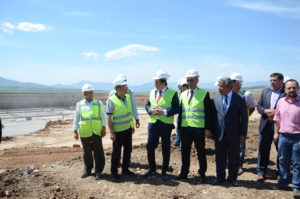
Support to Quality Infrastructure Framework within the DCFTA Context in the Republic of Moldova
The Moldovan Government has commitments under the EU Association Agreement (EU AA) roadmap relating to improving the domestic investment climate and enhancing the competitiveness of Moldovan businesses in foreign markets. This roadmap is designed to help close the country’s competitiveness gap, enhance its overall productive potential, move it

Improvement of Legislation, Control and Awareness in Food Safety, Animal Health and Welfare in Ukraine
The project aims to support the implementation of the Association Agreement’s provisions between the EU and Ukraine concerning food safety, animal health, and welfare.

Technical Assistance for Samsun Logistics Centre
The project was conceived, Turkey’s logistics network ranked 30th worldwide but offered much potential for improvement. With its strategic Black Sea location, seaports, airport and access to national rail and road networks, the Turkish city of Samsun was viewed as being in an excellent position to create a

Technical Assistance to Support CISOP 2014-2020 Operations, Information and Publicity
The overall aims of the “Technical Assistance to Support CISOP 2014-2020 Operations, Information and Publicity” are to increase the competitiveness of the Turkish economy, to open it up to innovation and to reduce regional socio-economic disparities across the country as the Turkish and EU economies converge. We are

Technical Assistance and Supervision for Kahramanmaraş Water and Wastewater Project
The quality of the drinking water and its consumption is one of the most critical topics for the European Union and the whole world. Based on this context, the programme aimed to accelerate Turkey’s accession to the EU by enabling Turkey to achieve a high level of environmental

Training for the Institutional Capacity Building on Climate Change Adaptation
The overall objective of the project is to improve climate change adaptation knowledge and the capacity of the Staff of Turkish institutions (members of CBCCAM (Climate Change and Air Management Coordination Board) for implementation of adaptation policies and projects.

